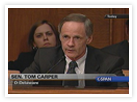Sep 13 2012
Hearing Statement: "Moving from Scandal to Strategy: The Future of the General Services Administration"
Homeland Security and Governmental Affairs Committee
WASHINGTON - Today, Sen. Tom Carper (D-Del.), Chairman of the Subcommittee on Federal Financial Management, Government Information, Federal Services, and International Security, released a statement on the Committee on Homeland Security and Governmental Affairs hearing, "Moving from Scandal to Strategy: The Future of the General Services Administration."
His statement follows:
"The details that have been brought forth regarding the General Services Administration's (GSA) mismanagement of its regional conferences have raised serious questions in the minds of the public about how government is managing taxpayer funds, as well as our efforts to curb wasteful spending. As everyone in this room knows, our nation faces record budget deficits.
"I think all of us can agree that the amount of inappropriate and unnecessary spending related to recent GSA conferences is deeply disturbing and unacceptable. There was clearly no thrift involved in the spending decisions GSA officials made in planning and executing this conference. During times like these – or at any time, really – we just can't afford to be this careless. With so many worthwhile programs across the federal government expected to have to do more with less, it's shameful that GSA would spend so much money for so little of value to the taxpayer.
"The Las Vegas conference that started the inquiry into GSA spending and management practices was not an aberration; rather, it revealed a systemic problem of excessive spending and misconduct within the agency. According to information provided by GSA to congressional committees, and subsequently published in the press, prior GSA Western Regions Conferences occurred in Oklahoma City, Okla. in 2006 and New Orleans, La. in 2008.
"One point is consistent throughout the Inspector General's report: we need to ensure that there is a system of internal controls in place to prevent this type of wasteful spending not just at GSA, but throughout our government. And I am pleased to see that GSA has implemented a number of key managerial controls to improve oversight of its regional offices and avoid a recurrence of this type of wasteful spending. The agency has canceled 47 conferences and saved more than $11 million through an initial set of policies implemented in April 2012 by the new head of the agency, Dan Tangherlini, to cut travel and conference costs.
"As Mr. Tangherlini and his team continues to look at ways to generate savings, I urge them to consider the structure of GSA's Public Buildings Service and the need to address long-standing property management problems so that we can minimize wasteful spending. For nearly a decade, the Government Accountability Office (GAO) has placed real property management on its list of 'high risk' government activities, in part due to the overwhelming number of excess and underutilized facilities held by federal agencies. This problem is exacerbated by federal agencies' reliance on costly leased space to meet new requirements, despite the fact that building ownership has proven to be more cost effective over time.
"To address these challenges, earlier this year, I along with Senators Portman, Pryor, Coburn, and Begich introduced S. 2178, the Federal Real Property Asset Management Reform Act of 2012. This legislation would facilitate the disposal of unneeded facilities, while establishing a framework for federal agencies to make more efficient use of existing space. The measure would also eliminate costly leasing arrangements, particularly those for longer-term needs that would be better served, from a life-cycle cost perspective, by government-owned facilities.
"In an era of shrinking budgets and scare resources, it is critical that the federal government becomes a better steward of the land and property it owns. As the landlord to most federal civilian agencies, it is my hope that GSA will continue to work with agencies to develop innovative property management tools that will identify opportunities to dispose of assets that are no longer serving their intended purpose, are exceptionally expensive to retain, or are little used."
 View Senator Carper's C-SPAN video library for recent appearances
View Senator Carper's C-SPAN video library for recent appearances
Facebookvisit page